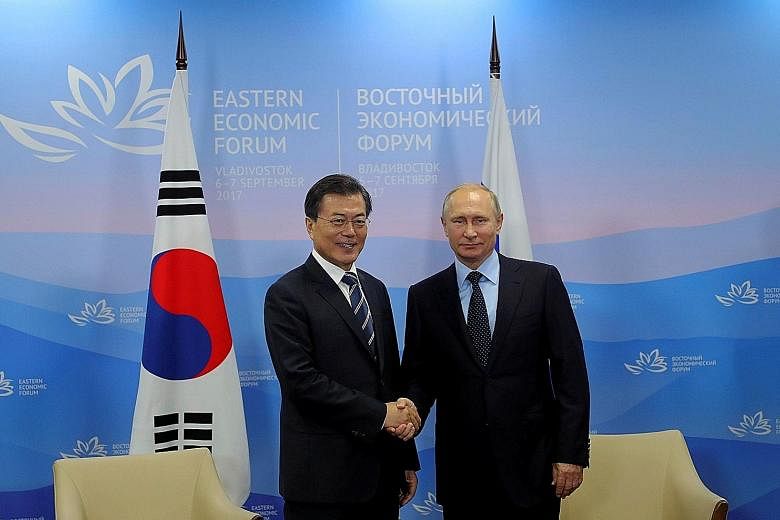If South Korean President Moon Jae-in had his way, there would be nine "bridges" linking Russia and his country.
Details of these nine areas of joint collaboration, which include a rail link and gas pipelines that could pass through North Korea, will be discussed during Mr Moon's visit to Russia, his second in nine months, said the presidential Blue House.
The denuclearisation of North Korea and joint economic projects that could benefit Pyongyang if it opens up, are expected to dominate talks between Mr Moon and Russian President Vladimir Putin today.
"President Putin and I share the vision of peace and joint prosperity in the Eurasian continent," he told Russian news media ahead of his trip. "(We) also share the common goal of completely denuclearising the Korean peninsula and establishing a peace regime."
The leaders' third summit meeting in 12 months comes as Russia joins China in pushing for an easing of sanctions against North Korea as it moves towards denuclearisation.
Mr Moon's three-day visit will "mark an important milestone in establishing a strategic partnership between South Korea and Russia while strengthening friendship and trust between the two leaders," said Mr Nam Gwan Pyo from the presidential national security office.
Deepening engagement with Russia as the Eurasian giant pivots east is part of Mr Moon's New Northern Policy aimed at boosting new growth drivers in the wider Northeast region as South Korea seeks to reduce over-reliance on traditional trade partners China and the US.
-
US$13.4b
-
Bilateral trade between South Korea and Russia in 2016.
-
US$30b
-
What South Korean President Moon Jae-in hopes to raise it to by 2020.
It also seeks to reach out to the increasingly conciliatory Pyongyang, with ambitious plans to revive two long-stalled proposals to run railway tracks and gas pipelines through North Korea so as to link Russia and South Korea. The plans were shelved when inter-Korea ties soured.
Bilateral trade between South Korea and Russia in 2016 reached US$13.4 billion (S$18 billion), a figure that Mr Moon hopes to raise to US$30 billion by 2020. South Korea's key exports to Russia include vehicles, auto parts and heavy equipment.
Analysts have said both countries can tap a wealth of potential if they work well together, noting that their economies are complementary.
As Mr Moon himself noted in a meeting with Mr Putin in Vladivostok last September, "the combination of vast resources in the Russian Far East and Korea's advanced technologies will make the region a land of opportunity for the prosperity of Korea and Russia".
Global consultancy firm Control Risks said plans to improve Russia's infrastructure, mainly road and rail, could cost US$67 billion, and this would "largely benefit" South Korean builders keen to take on these projects.
The two leaders are also expected to discuss the denuclearisation of North Korea, which leader Kim Jong Un has pledged to do in two agreements - one signed with US President Donald Trump in Singapore last week, and the other with Mr Moon in April.
A Blue House spokesman said Moscow's role in denuclearisation and establishing permanent peace on the Korean peninsula is "highly anticipated".
Russia, like China, is urging the US to ease punitive sanctions on North Korea as Mr Kim has agreed to start the denuclearisation process.
Mr Putin last week extended an invitation to Mr Kim, who is Chairman of North Korea's State Affairs Commission, for a visit in September.
Professor Kim Byung Ki of Korea University told The Straits Times that Mr Moon is seeking strong support for North Korea's nuclear disarmament not only from the US and China, but also Russia.
"He needs to make sure that Russia is in the loop and not isolated. That is a very important reason for him to go to Russia, " Prof Kim said.
Mr Chris Cheang, senior fellow at the S. Rajaratnam School of International Studies, noted in a commentary that as an immediate neighbour, Russia "cannot help being involved and concerned" about North Korea's future, and thus "seeks a role" in the denuclearisation process. "Moscow would not look kindly upon a destabilised North Korea if the denuclearisation effort were to fail and tensions with the US were to resume."


